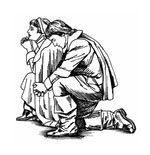
The Quest to Know
ON FINDING OUR CONTEXT IN THE COSMOS
“Who you? Why you here?” Grace Rose Martin, my three-year-old granddaughter, asked Anna Martin, her 91-year-old great-grandmother, at a family reunion. Lo and behold, Grace is a philosopher: She has a sense of wonder and the desire to know. Philosophy begins in wonder when we affirm that sentiment is anterior to reason. In fact, if I did not know better, I would have thought Grace knew her purpose by having read the first sentence of Aristotle’s Metaphysics, “All men by nature desire to know.”
Grace’s questions are as fundamental to being human as childhood is to becoming an adult. Her questions were answered on the literal level: “I am Anna Martin, and I am here for the wedding.” My mother’s answers satisfied Grace — for the moment — but they will not stop her from continuing to ask a plethora of questions as she seeks to weave coherence out of her surroundings.
As Grace matures, the philosophical muse of the examined life must turn inward if she is ever to fulfill herself as an adult. In other words, her questions must become “Who am I?” and “What am I doing here?”
Grace is currently untroubled by self-examination as she bounces about in play. She is, as all children are, “in the now,” a state of innocence in which each moment is sparkling new.
You May Also Enjoy
The Right in Western Europe is the immediate heir to the pre-1945, even pre-1914, system of values which it keeps alive on the political/cultural landscape.
Review of Just As I Am: The Autobiography of Billy Graham
Young women also are spiritually hungry for a sense of purpose and meaning in life, for something or someone to believe in, for moral direction.

